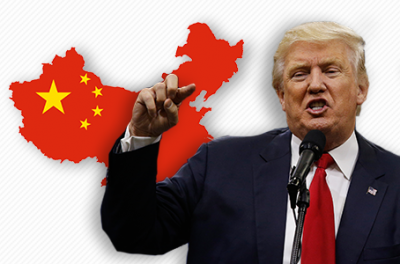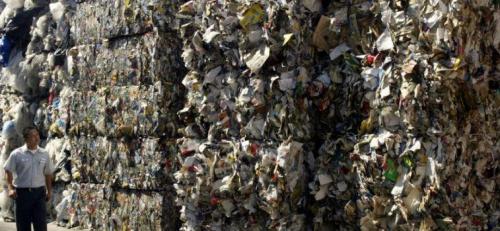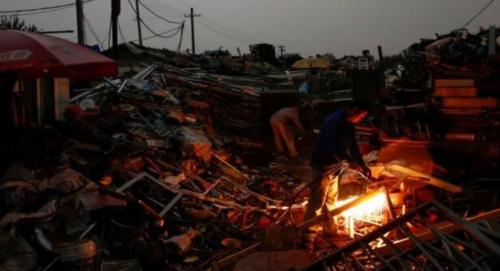Trump’s Trade War: US Demands China Keep Importing American Garbage

As it tries to strike an agreement with the US to avert a trade war that economists fear could destabilize global markets, China has an ace up its sleeve that it’s just about ready to play: The Communist Party last year implemented a ban on imports of recyclable material that is provoking a mild panic in the US.
The reason? The US relies on China to “import” much of its bulk recyclable waste. But last July, in an effort to battle the “illegal foreign garbage” influx into China, the country’s Ministry of Environmental Protection notified the World Trade Organization that it plans to ban imports of 24 types of solid waste materials, including soda bottles, mixed paper, recycled steel and newsprint.
Despite the threat to implement the ban by the end of the year, the document stated that the “proposed date of adoption” is “to be determined.”
But by moving ahead with the decision, China risks creating serious problems for the global recycling industry, something that would probably have the greatest impact on the US by essentially forcing it to make difficult choices about how it process its solid waste, including – most notably – how and where it is stored.

According to Reuters, which was the first western media outlet to report on the decision, the US Institute of Scrap Recycling Industries said at the time that the ban would devastate an industry that supported 155,000 jobs and had exported scrap worth $5.6 billion to China in 2016.
“China’s import restrictions on recycled commodities have caused a fundamental disruption in global supply chains for scrap materials, directing them away from productive reuse and toward disposal,” a US representative told the meeting, according to a trade official in Geneva.
The United States recognized China’s environmental concerns but Beijing’s approach seemed to be having the opposite effect to what was intended, and its rules had changed far too quickly for industry to adjust, the U.S. representative told the meeting.
The US also accused China of violating its obligations under the WTO framework.
China seemed to be breaching its WTO obligations by treating domestic and foreign waste differently and employing an overly trade-restrictive policy, the U.S. official said.
“We request that China immediately halt implementation and revise these measures in a manner consistent with existing international standards for trade in scrap materials, which provide a global framework for transparent and environmentally sound trade in recycled commodities.”
Washington’s demand came a day after President Trump ordered the US trade rep to levy tariffs on at least $50 billion of Chinese imports. Although the USTR was given 15 days by Trump to propose a list of Chinese products that would be targeted, China’s commerce ministry had already threatened to take legal action against the US through the WTO. The country is also contemplating targeting 128 American products through an imposition of harsh import tariffs – though earlier today officials from both countries privately confirmed to the Wall Street Journal and other media organizations that a deal could soon be reached.
The Chinese Foreign Ministry also made clear that it has the means to fight a potentially devastating trade war with the US but urged Washington to reconsider its aggressive economic policy. Beijing warned that “the American consumers and enterprises will bear the brunt” of a trade war with China.

According to RT, China is by far the biggest importer of US recyclables. Banning US junk imports will have a catastrophic impact on the US labor market and will drive up waste management costs. The Chinese representative at the meeting in Geneva on Friday agreed to relay the US’s concerns to Beijing, though the envoy still noted that, ultimately, individual countries are responsible for their own waste.
“In any given year, approximately one-third of the scrap recycled in the United States is prepared for shipment to the export market, and China is the recycling industry’s largest customer,” ISRI President Robin Wiener told China Daily earlier. “This includes more than $1.9 billion in scrap paper and $495 million in scrap plastics. A ban on imports of scrap commodities into China would be catastrophic to the recycling industry.”
If the world’s No. 2 economy closes off its waste-management market, recycling centers across the US would be faced with a hard choice. They can either hire a much more expensive workforce which would raise prices for their services, require households to sort their own waste, or be forced to use more landfills across all fifty US states.
Of course, there’s a third option: Find new foreign buyers for its bulk waste. But doing so would be incredibly fraught because there’s no single buyer – or even group of buyers – that could adequately make up for China’s heft.
Regardless of what happens, one thing is for certain: While China likely won’t be able to force concessions on major issues like America’s complaints about China’s methods for siphoning off foreign IP, the garbage issue could loom large in the closed-door discussions currently taking place to strike a more equitable trade deal that would appeal both Trump and his factory-town base.

